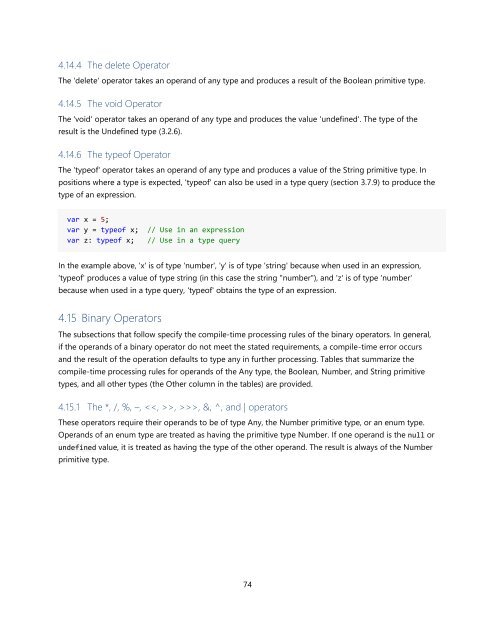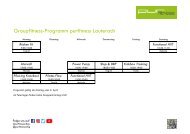TypeScript Language Specification v1.5
TypeScript Language Specification v1.5
TypeScript Language Specification v1.5
You also want an ePaper? Increase the reach of your titles
YUMPU automatically turns print PDFs into web optimized ePapers that Google loves.
4.14.4 The delete Operator<br />
The 'delete' operator takes an operand of any type and produces a result of the Boolean primitive type.<br />
4.14.5 The void Operator<br />
The 'void' operator takes an operand of any type and produces the value 'undefined'. The type of the<br />
result is the Undefined type (3.2.6).<br />
4.14.6 The typeof Operator<br />
The 'typeof' operator takes an operand of any type and produces a value of the String primitive type. In<br />
positions where a type is expected, 'typeof' can also be used in a type query (section 3.7.9) to produce the<br />
type of an expression.<br />
var x = 5;<br />
var y = typeof x; // Use in an expression<br />
var z: typeof x; // Use in a type query<br />
In the example above, 'x' is of type 'number', 'y' is of type 'string' because when used in an expression,<br />
'typeof' produces a value of type string (in this case the string "number"), and 'z' is of type 'number'<br />
because when used in a type query, 'typeof' obtains the type of an expression.<br />
4.15 Binary Operators<br />
The subsections that follow specify the compile-time processing rules of the binary operators. In general,<br />
if the operands of a binary operator do not meet the stated requirements, a compile-time error occurs<br />
and the result of the operation defaults to type any in further processing. Tables that summarize the<br />
compile-time processing rules for operands of the Any type, the Boolean, Number, and String primitive<br />
types, and all other types (the Other column in the tables) are provided.<br />
4.15.1 The *, /, %, –, , >>>, &, ^, and | operators<br />
These operators require their operands to be of type Any, the Number primitive type, or an enum type.<br />
Operands of an enum type are treated as having the primitive type Number. If one operand is the null or<br />
undefined value, it is treated as having the type of the other operand. The result is always of the Number<br />
primitive type.<br />
74


















